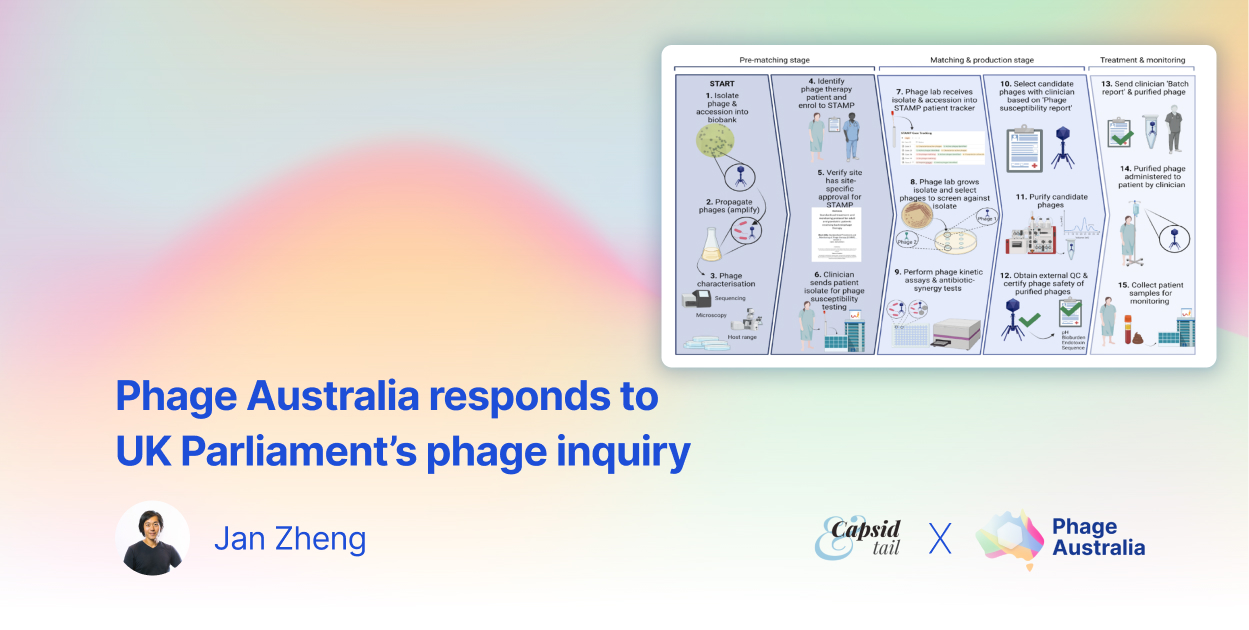Summary of The antimicrobial potential of bacteriophages – UK Parliament Inquiry 2023
Read the paper on Phage Australia
In January of this year, the UK Parliament Science and Technology Committee opened an inquiry on the “antimicrobial potential” of using phages. Many individuals from the phage world, including Dr. Jean-Paul Pirnay from Belgium, Dr. Mzia Kutateladze of Eliava, Dr. Chip Schooley from UCSD/IPATH and Dr. Jon Iredell from Phage Australia presented oral evidence. The meeting minutes and the entire video recording is available online.
This white paper, written by the Phage Australia, team, documents Phage Australia’s response to the UK Parliament’s inquiry. It explores the antimicrobial potential, the regulatory pathways, and the associated challenges and opportunities of using phages — from a uniquely Australian perspective.
The paper highlights the strengths of bacteriophages, including their specificity, potential for ‘autodosing’, capacity to be used as delivery systems, synergistic opportunities, and continued activity in the face of antibiotic resistance.
The paper also notes challenges in using phages, including uncertainty of best practices in applying phages in therapy, lack of clarity in regulatory frameworks, and lack of IP protection as defensibility to phage therapy as a business model.
The paper concludes that by combining phage therapy with surveillance and standardized monitoring programs, production and batch quality control, and that “a tiered approach to working cell banks in GMP pathways can be used to develop an economically viable model for phage therapy.”
Insights from the Inquiry
The Phage Australia team found a few interesting things from the UK Inquiry (quotes from the white paper):
- Most submissions highlighted the lack of regulatory clarity and limitation in production capacity in the UK
- There’s also a lack of regulatory clarity internationally, as different countries approach regulation, implementation and clinical treatments differently
- Everyone agreed that AMR is a critical issues, every group is committed to tackling AMR, and “phage therapy is safe and effective against AMR when used appropriately”
- There were six questions that still remain unanswered in the field:
- Phage specificity: one phage to one bacterium or phage cocktails.
- Phage engineering: lack of lytic phage against some bacteria leads to the need for training phages or genetically modifying (GMO) phages.
- Bacterial host engineering: lab strain bacterial hosts and/or patient-derived bacterial hosts are currently used in phage production.
- Bacterial resistance: bacteria and phages co-evolve.
- Immune response: anti-phage antibodies are known to neutralise phages in cell culture and in animal experiments but there are limited data demonstrating human immune responses in vivo to this observation.
- Treatment time frame: Treatment durations are arbitrarily set at present but mimic typical durations of antibiotic therapy.
Highlights from Phage Australia’s Response
- The evidence base for phages as an antimicrobial is strong in regard to safety, but is weak in regard to efficacy.
- The strengths of bacteriophages are their specificity, capacity for in vivo adaptation to bacterial resistance/avoidance, potential for ‘autodosing’, capacity to be used as delivery systems, common additive or synergistic action with antibiotics, and continued activity in the face of antibiotic resistance.
- Challenges include the need to have many phages to deal with bacterial diversity, uncertainty in regard to best-use applications of phage therapy, regulatory frameworks, and their status as ubiquitous naturally occurring viruses that are easily sourced and amplified.
- Regulatory pathways are unresolved and are being worked through in Australia in an attempt to provide both export-ready (GMP track) and ‘compassionate use’ (GMP exempt) pathways.
- GMP pathways need to accommodate the diversity of phages required.
- Careful linkage with surveillance programs and a tiered approach to working cell banks in GMP pathways can be used to develop an economically viable model.
- Clinical training course might be developed to enable graduates to access therapeutic phages.
- An important early step taken in Australia has been to develop consensus around the need and the initial approach to monitoring.
- The principal bottleneck is manufacturing.
The paper goes much deeper into each of these highlights, and is well worth the read. Visit the Phage Australia website to read the full paper or download the PDF version here.







